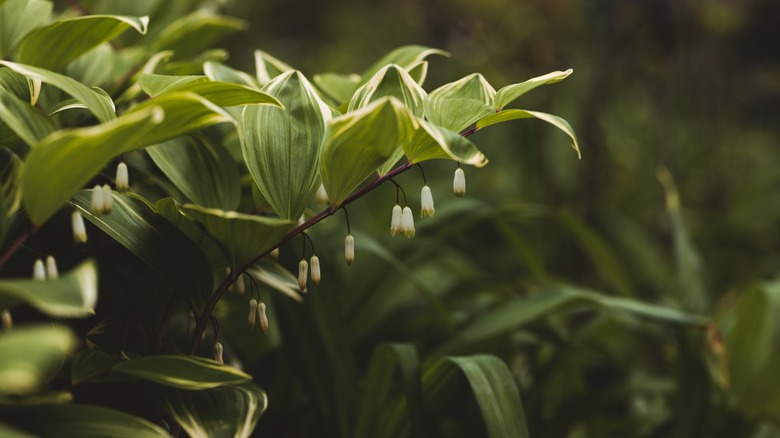The Ground Cover That Offers Delicate White Flowers For Beautifying Tree Roots
Growing beautiful flowers under mature trees with large roots can be a challenge. Not only are the flowers likely to receive little sun, but they're also likely to receive little irrigation as they'll be competing with the tree roots for water. That doesn't mean you have to give up on growing flowers there though, instead, you can opt for growing the delicate white flowers of Solomon's seal (Polygonatum spp.).
Solomon's seal is a broad term given to many flowering plants in the Polygonatum genus. Some, like smooth Solomon's seal (P. biflorum), are even native to North America. While most varieties of Solomon's seal have pretty, but plain, green leaves, others, like variegated or angled Solomon's seal (P. odoratum var. pluriflorum 'Variegatum') also offer variegated foliage, making for a stunning and colorful ground cover even when the flowers aren't in bloom. Most species of Solomon's seal are hardy in zones 3 through 9 making them great easy-to-grow ground cover options in large parts of the United States. Thanks to their shade tolerance and flexibility on soil moisture, they're ideal for adding color around tree roots and in other challenging areas.
Growing and caring for Solomon's seal
Solomon's seal plants,whether you prefer variegated or other varieties, are widely available to purchase both as bare roots and young plants with foliage. If you have any friends or family with this beautiful plant, you may be able to get a division of their Solomon's seal for free. Solomon's seal is happiest in soil with plenty of compost or other organic material and while it prefers moist soil, it is relatively drought-tolerant. Solomon's seal can be poisonous, so be careful with this plant if you have young children.
Solomon's seal doesn't just give you delicate flowers for shady spring gardens, this perennial also provides autumnal interest thanks to its gorgeous golden leaf color in fall and its small dark blue fruits. It can also make a perfect substitute for lily of the valley, as unlike lily of the valley, which is invasive in many parts of North America, Solomon's seal is not prone to being overly aggressive.

